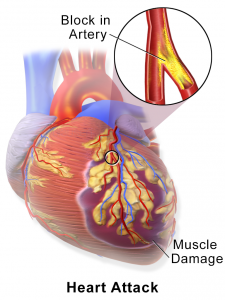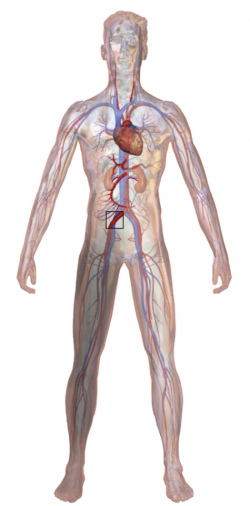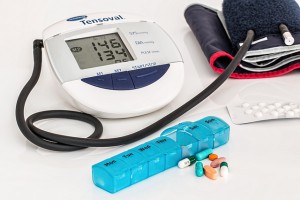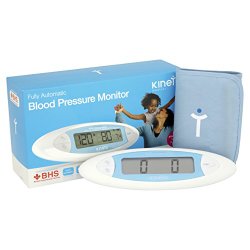The health risks of high blood pressure
Heart attack and stroke

If your blood pressure is between 90 and 120 systolic, that is considered to be healthy as your risk of cardio vascular disease and stroke is minimal. At 140 systolic blood pressure you will have twice the risk of dying from a heart attack or stroke than if your level was normal. This is the level at which your doctor will likely prescribe medication to bring your blood pressure down. You will also probably be advised to change your diet to healthier options, take more exercise and lose some weight if you are, in fact, overweight. At a level of 160 systolic pressure, your risk is doubled yet again ie. you are 4 times more likely to die from a heart attack or stroke than if your blood pressure was normal. So for every 20mmHg rise, your risk of death from a heart attack or stroke doubles, so at a level of 180 systolic you are 8 times more likely to die of a heart attack or stroke and the risk goes on up the scale.
Vascular dementia
Vascular dementia is the second most cause of dementia after alzheimer’s and it happens as a result of a stroke. Keeping your blood pressure at optimum levels will greatly reduce your chances of having a stroke and the further complication of vascular dementia.
 Peripheral artery disease (PAD) – Peripheral vasculardisease (PVD)
Peripheral artery disease (PAD) – Peripheral vasculardisease (PVD)
Blood pressure that is left untreated can cause much damage within the body. It puts a burden on the arteries in your arms and legs and can cause blood vessels to narrow causing pain and cramps. The arteries become impaired when fatty deposits build up around the damaged areas. This accumulation which is called atherosclerosis, is produced when fatty material mixed with calcium, scar tissues and other substances, hardens forming atherosclerotic plaques. The plaques narrow or even block the weakened vessel walls, restricting or stopping blood flow.
Blood Pressure and Magnesium Deficiency
Getting blood pressure down
 If you are a smoker, stop. If you eat junk food, give it up and start eating healthy ‘unboxed’ and ‘unprocessed’ food. If you drink too much, kerb it or stop altogether. Get out of that chair and do some exercise. If you’re overweight, do something about it. It’s your health and only you can decide you will change your life for the better.
If you are a smoker, stop. If you eat junk food, give it up and start eating healthy ‘unboxed’ and ‘unprocessed’ food. If you drink too much, kerb it or stop altogether. Get out of that chair and do some exercise. If you’re overweight, do something about it. It’s your health and only you can decide you will change your life for the better.
We’ve now come full circle from the start of this two part post. This is where it has been leading, blood pressure and Magnesium
 deficiency. To help you maintain your new healthy lifestyle, there is a supplement which will enable you to achieve all those necessary changes to reduce your blood pressure and reduce other effects you are probably suffering from by not having enough Magnesium in your body.
deficiency. To help you maintain your new healthy lifestyle, there is a supplement which will enable you to achieve all those necessary changes to reduce your blood pressure and reduce other effects you are probably suffering from by not having enough Magnesium in your body.
One of the most important and quickest benefits you will gain when you start taking Magnesium is an immediate increase in energy. This energy boost will enable you to do the exercise necessary to start your new regime. You will notice that you sleep better, a real bonus for those with insomnia. You will want to exercise, because up until now, you have not had the energy or inclination and that’s not your fault. Without Magnesium to produce ATP (adenosine triphosphate), the energy packets that feed your cells, you literally can’t move how you want to and if you force it, it hurts!

If you have pushed yourself to exercise, you will likely have suffered from pains in your back and legs and experienced lactic acid buildup, a sure sign of Magnesium deficiency. Once you start taking your Magnesium, you will be able to exercise without pain and after effects. This will encourage muscle growth, which will help you lose weight. This will enthuse you to eat healthy to increase your weight loss.
Magnesium is a great lifter of mood and you will start feeling happier, less stressed out and more optimistic. This will give you the impetus and motivation to carry on with your new lifestyle. You will be absolutely amazed how this natural supplement will change your life. I am the proof and I want you to feel as lively, happy and healthy as I do. This is why I started this website, to spread the word about the miracle of Magnesium.
Stopping blood pressure medication?
If you’re on blood pressure tablets, there’s a good chance that you will be able to gradually reduce your medication and perhaps stop it altogether. My blood pressure is in the healthy bracket. I take no medication whatsoever. The only thing I take is 500-600mg of Magnesium Chloride daily. If I know I will have a stressful day, I will up my dose to cover it. Stress will rapidly deplete your Magnesium levels.
What about a blood pressure monitor?
It’s your body and you know how you feel more than anyone. Taking charge and knowing your blood pressure, will help you help yourself. Buying a monitor will allow you to keep your own records of how your blood pressure is improving daily. Take a reading before you see your doctor for a blood pressure test and compare your reading with his. If it’s elevated compared to your home reading, don’t worry. You’re exhibiting ‘white coat syndrome’. Your blood pressure will go back to its normal reading when you get home. Make sure you buy a monitor which is known for its accuracy.
 I will be reviewing the most popular blood pressure monitors over the next week or so, meanwhile, the image shows a very reasonably priced monitor renowned for its accuracy. It has no bells and gongs on it but it does what it’s supposed to do ie. tests your blood pressure accurately. It is also small and light enough to take away on holiday. This blood pressure monitor comes top of my list! What a great Christmas present!!
I will be reviewing the most popular blood pressure monitors over the next week or so, meanwhile, the image shows a very reasonably priced monitor renowned for its accuracy. It has no bells and gongs on it but it does what it’s supposed to do ie. tests your blood pressure accurately. It is also small and light enough to take away on holiday. This blood pressure monitor comes top of my list! What a great Christmas present!!
I was already afraid of dementia but this page made me realize even more now why I should be afraid of it. This is just a reminder to me of why I should keep eating healthy and at the same time eat less junk food haha. Well I must say this is some really great information. I’ll definitely have to show some of my friends and family this page because they are likely to be interested in stuff like this.
Neat stuff!
Chris
Hi Chris and thanks for reading this article. I think dementia is a fear for all of us and stroke as well. My husband is taking magnesium regularly because, he says, “I don’t want a stroke”. We recently lost a friend who, to be quite honest, lived a very unhealthy lifestyle, he said he’d be alright anyway. He then had a massive stroke and couldn’t do anything and died after 2 years bedridden. We need to take our health into our own hands and not just leave it up to the medics. Good health to you Chris, Ches
Magnesium is found in every blade of grass and every leaf,it is essential component of chlorophyll in plants,feeding them indispesable.The structure of chlorophyll in plant crops is perfectly identical to that of hemoglobin in human blood,the only difference being that hemoglobin contains an iron atom,while chlorophyll contains a magnesium atom.In our body there are 25mg of magnesium,we need 300-500mg per day,which we should assimilate in our daily food.A very interesting article,thanks!
Hi there Dorina, You are right on all counts and as it is autumn here in the UK, all the Magnesium (Mg) is draining out of the deciduous plants’ foliage and going back into the permanent part of the plant ready for the next season. Mg has been with us since the beginning of life, no wonder it is so vital to keep us, other animals and plants healthy. Good luck to you and all the best, Ches
Hello Ches,
First, thank you for your awesome website. I have several migraines during the month, and I’ve never thought about magnesium !
Reading your articles is very impressive, in my opinion. We can see that you take the time to make research and to explain to your readers.
Also, I like the way you explain the affiliate programm WA.
Well, my english is not famous, I could say…awkward. Hope you Understand me !
Hello Audrey and thanks for reading the post. I sincerely hope taking Magnesium (Mg) will help your migraines, I think you will be surprised how much Mg would relieve your symptoms. Thank you also for your kind words, I do try to thoroughly research the subject I’m passionate about. As far as your english is concerned, I can guarantee that it’s better than me trying to speak in your mother tongue! Good health to you and good luck, Ches
Hey Chessie,
Very informative article.
Some things I am curious about are what levels of magnesium should one take? Does it differ from men to women? Would the amount in a multivitamin be sufficient or would I need to take straight magnesium pills to reap the most benefit?
Also red meat is a good source of magnesium, although recently they say that it gives you cancer, which is weird, everything gives you cancer these days.
Aiden
Freedom Weight Loss
Hi Aiden and thanks for reading the post. Depending on your weight you need 300-400mg of Magnesium (Mg) per day to keep healthy and to balance your calcium levels, which are usually higher than your Mg levels, which is not good. The best Mg supplement to take is Mg chloride. Tablets are often Mg oxide which is the cheapest and least effective. Mg citrate also comes in tablet form but can be laxative, useful to some who want a laxative effect. You need to check the multivitamin for the mg value and the type of Mg being used. Red meat is good as long as it’s grass fed and naturally reared. Keep away from processed and ‘boxed’ food and eat natural, wholesome and organic where possible and you should keep healthy and cancer free, if your genes allow! Ches